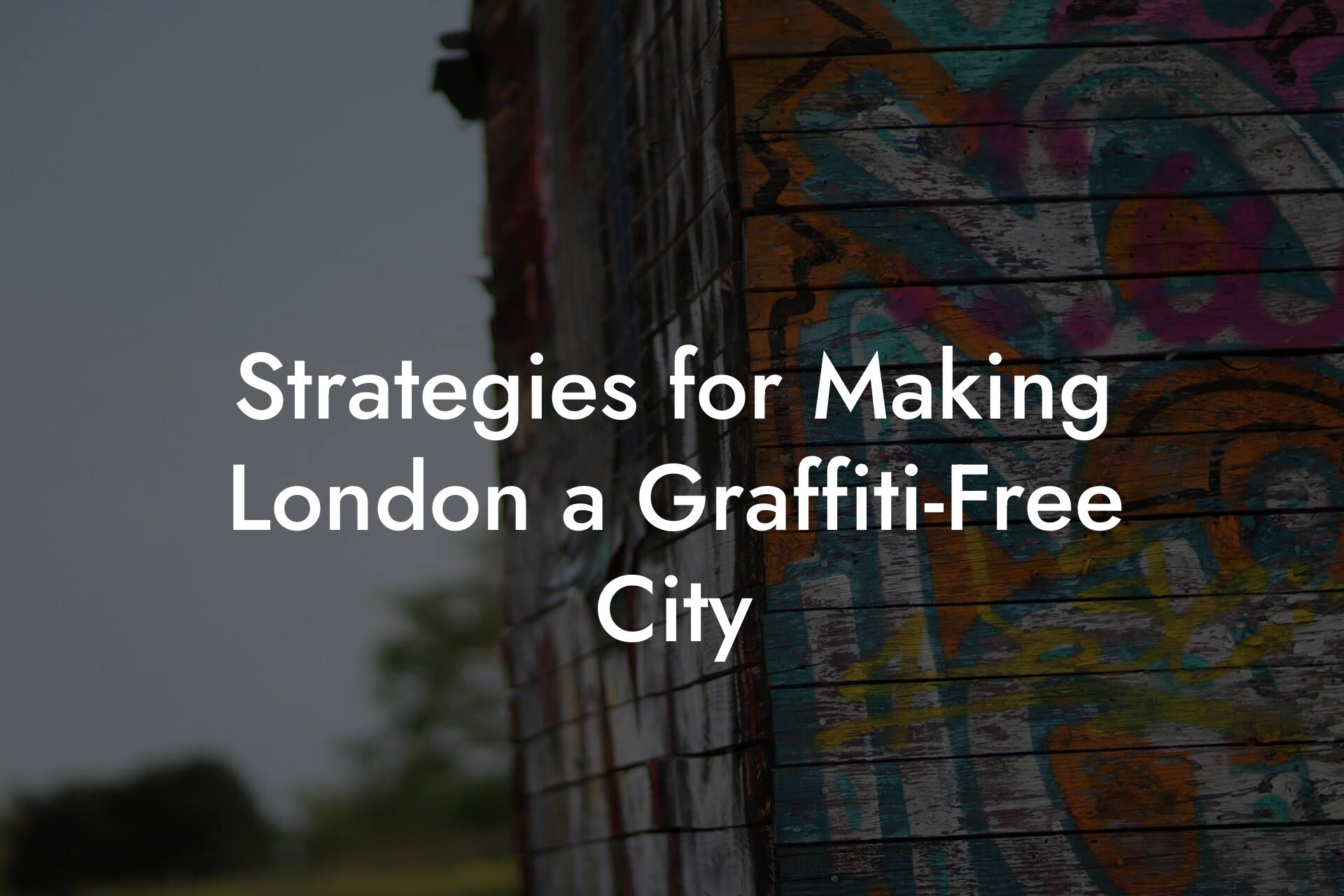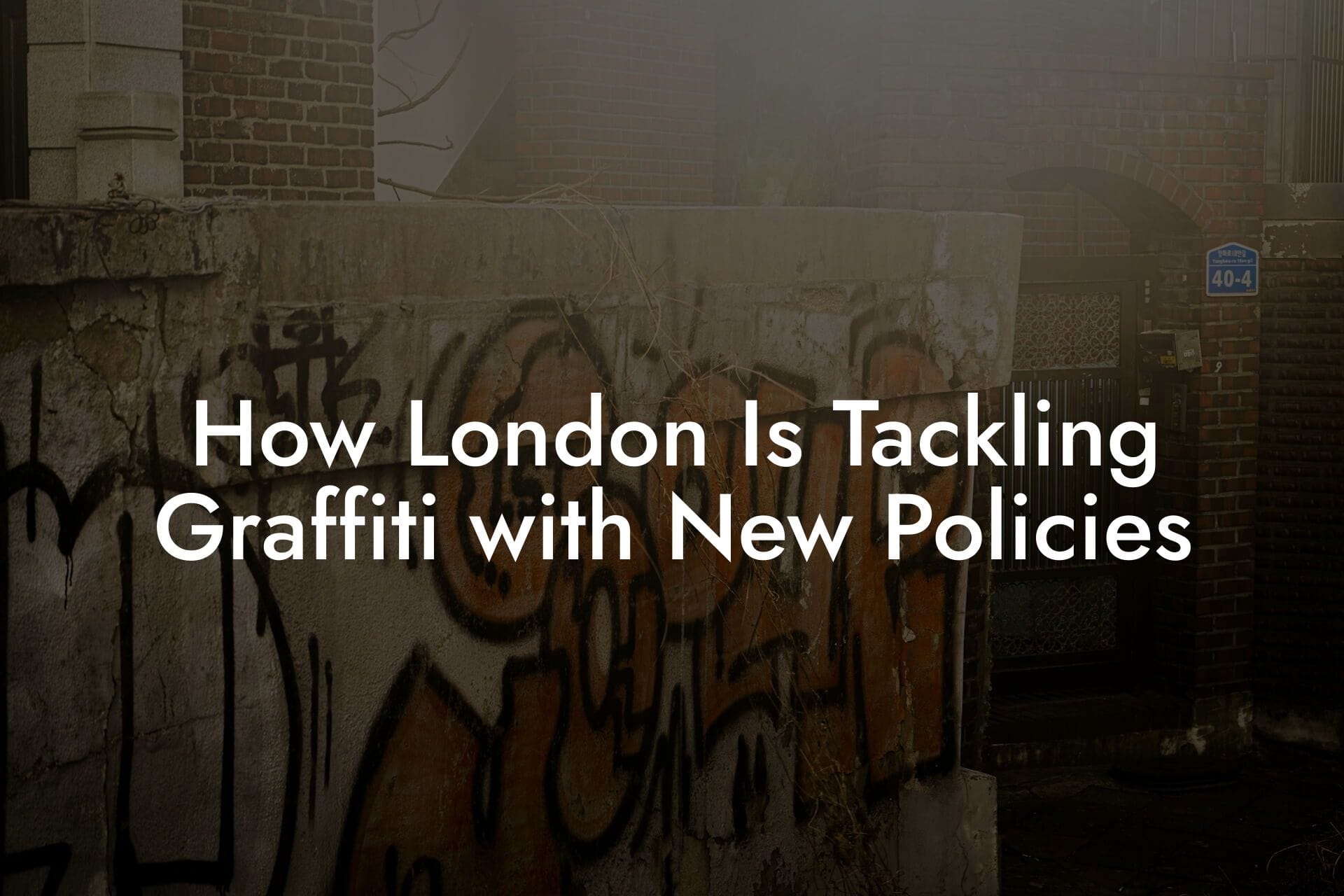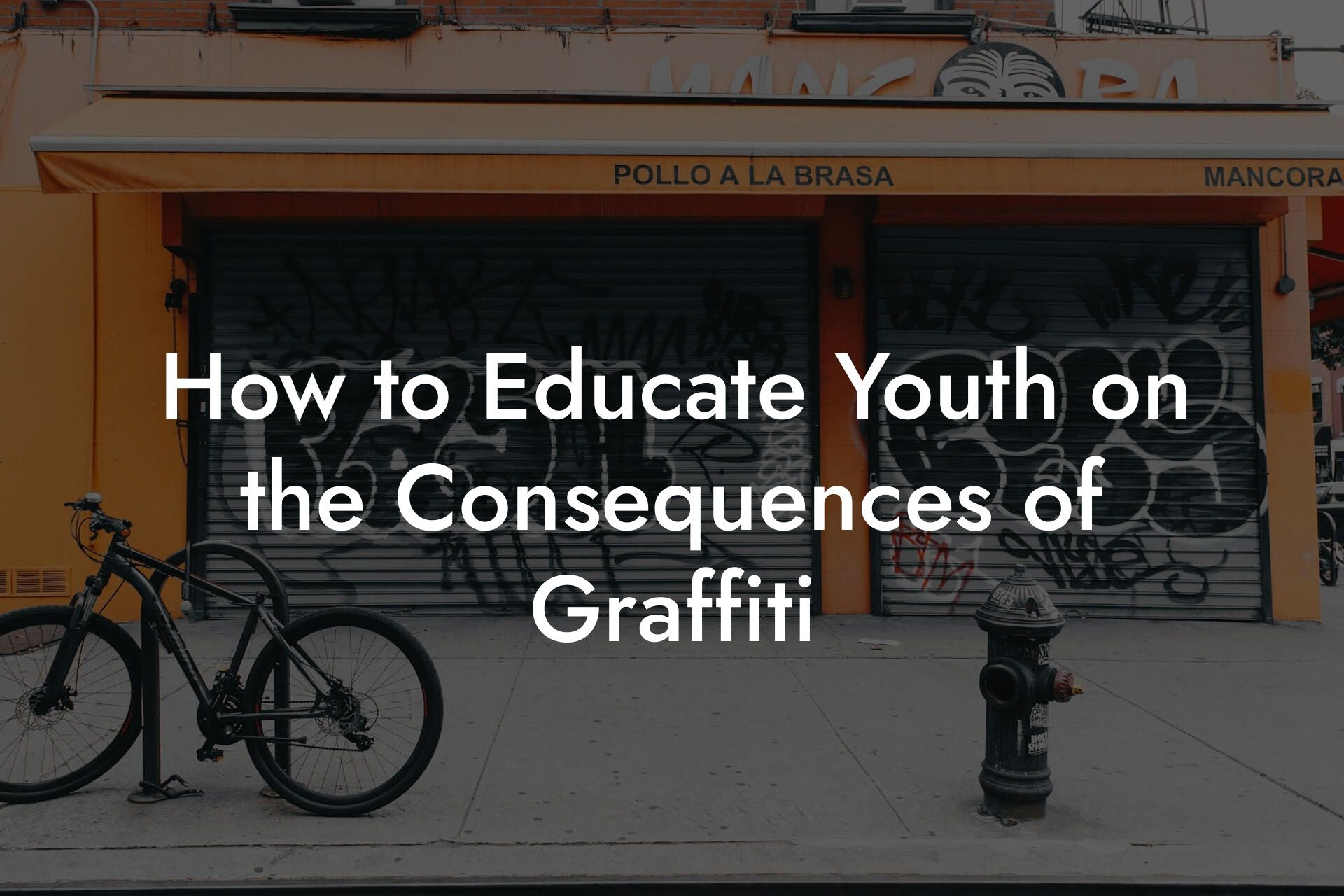Graffiti vandalism is a persistent problem that affects businesses and communities across London. The removal of graffiti is not only a financial burden but also a time-consuming task that can impact a business's reputation and customer perception. However, when businesses and councils work together, they can effectively combat graffiti and create a safer and more attractive environment for everyone. In this article, we will explore the importance of collaboration between businesses and councils to combat graffiti and provide guidance on how to establish a successful partnership.
Table of Contents
The Impact of Graffiti on Businesses
Graffiti can have a significant impact on businesses, affecting their reputation, customer perception, and ultimately, their bottom line. When a business is vandalized with graffiti, it can create a negative impression on potential customers, making them less likely to visit or shop at the location. Additionally, graffiti can also lead to a decrease in property value, making it harder for businesses to attract investors or sell their property. Furthermore, the removal of graffiti can be a costly and time-consuming process, taking away from a business's resources and productivity.
The Role of Councils in Combating Graffiti
Councils play a crucial role in combating graffiti in their local areas. They are responsible for enforcing anti-graffiti laws and regulations, as well as providing resources and support to businesses and residents affected by graffiti. Councils can also work with local community groups and organizations to educate young people about the negative impacts of graffiti and promote alternative forms of artistic expression. Moreover, councils can provide graffiti removal services or partner with private companies, like Graffiti Removal London, to provide efficient and effective removal solutions.
Benefits of Collaboration Between Businesses and Councils
When businesses and councils work together, they can share resources, expertise, and knowledge to combat graffiti more effectively. This collaboration can lead to a range of benefits, including:
- Improved communication and coordination: By working together, businesses and councils can share information about graffiti hotspots, taggers, and removal strategies, ensuring a more targeted and effective response.
- Enhanced resources: Councils can provide resources, such as funding, equipment, and personnel, to support businesses in their graffiti removal efforts. Similarly, businesses can provide councils with valuable insights into the impact of graffiti on their operations and customers.
- Increased community engagement: Collaboration between businesses and councils can help to engage local communities in anti-graffiti initiatives, promoting a sense of ownership and responsibility among residents and businesses.
- Cost savings: By sharing resources and expertise, businesses and councils can reduce the financial burden of graffiti removal and allocate funds more efficiently.
Establishing a Successful Partnership
To establish a successful partnership between businesses and councils, it is essential to:
- Identify common goals and objectives: Businesses and councils should work together to identify shared goals and objectives, such as reducing graffiti incidents, improving community safety, and enhancing the local environment.
- Define roles and responsibilities: Clearly define the roles and responsibilities of each partner, ensuring that both parties understand their obligations and expectations.
- Establish open communication channels: Regular communication is crucial to the success of any partnership. Businesses and councils should establish open and transparent communication channels to share information, provide updates, and address concerns.
- Develop a joint action plan: Create a joint action plan that outlines the strategies, tactics, and timelines for combating graffiti. This plan should be regularly reviewed and updated to ensure it remains effective and relevant.
Best Practices for Graffiti Removal
When it comes to graffiti removal, it is essential to use best practices to ensure that the removal process is effective, efficient, and safe. Some best practices for graffiti removal include:
- Using the right removal products: Choose removal products that are specifically designed for graffiti removal, taking into account the type of surface, the type of graffiti, and the environmental conditions.
- Employing trained professionals: Graffiti removal requires specialized skills and knowledge. Employ trained professionals, like those at Graffiti Removal London, who have the expertise and equipment to remove graffiti safely and effectively.
- Documenting incidents: Documenting graffiti incidents can help to identify patterns, track taggers, and provide evidence for legal proceedings. Take photos, note the location and time of the incident, and report it to the authorities.
- Preventing re-occurrence: Take steps to prevent re-occurrence, such as installing security cameras, improving lighting, and increasing foot traffic in the area.
Collaboration between businesses and councils is essential to combating graffiti effectively. By working together, sharing resources, and leveraging each other's expertise, businesses and councils can create a safer, more attractive, and more prosperous environment for everyone. At Graffiti Removal London, we are committed to providing businesses with the expertise and resources they need to combat graffiti and restore their properties to their former glory. By working together, we can make a real difference in our communities and create a better future for all.
Additional Resources
If you are a business owner or council member looking to combat graffiti in your area, there are a range of additional resources available to support you. These include:
- The Graffiti Removal London website: Our website provides a wealth of information on graffiti removal, including tips, guides, and resources for businesses and councils.
- Local community groups: Many local community groups, such as the London Community Foundation, offer resources and support for anti-graffiti initiatives.
- Council websites: Council websites often provide information on graffiti removal services, reporting procedures, and anti-graffiti initiatives in your local area.
- National organizations: Organizations, such as the UK Government's Department for Communities and Local Government, provide guidance and resources on combating graffiti and promoting community safety.
Frequently Asked Questions
What is the impact of graffiti on businesses and local communities?
Graffiti can have a significant impact on businesses and local communities, affecting their reputation, property value, and overall aesthetic appeal. It can also contribute to a sense of disorder and neglect, potentially driving away customers and investors. Moreover, graffiti can be a blight on community pride and morale, making it essential for businesses and councils to work together to combat this issue.
Why is collaboration between businesses and councils crucial in combating graffiti?
Collaboration between businesses and councils is vital in combating graffiti as it allows for a unified approach to addressing the issue. By working together, they can share resources, expertise, and knowledge to develop effective strategies for prevention, removal, and prosecution. This collaboration also fosters a sense of shared responsibility and encourages community engagement in maintaining a clean and safe environment.
What are the benefits of rapid graffiti removal?
Rapid graffiti removal is essential in preventing the spread of graffiti and maintaining a clean environment. It sends a clear message that graffiti will not be tolerated and can help to deter future incidents. Additionally, rapid removal can prevent the graffiti from becoming a permanent fixture, reducing the need for costly and time-consuming removal processes.
How can businesses contribute to graffiti prevention?
Businesses can contribute to graffiti prevention by implementing measures such as installing security cameras, improving lighting, and maintaining a clean and well-maintained property. They can also engage with local authorities and community groups to raise awareness about the issue and promote a sense of community ownership. Furthermore, businesses can support local anti-graffiti initiatives and participate in clean-up events to demonstrate their commitment to maintaining a graffiti-free environment.
What role do councils play in combating graffiti?
Councils play a crucial role in combating graffiti by providing resources, support, and legislation to address the issue. They can implement initiatives such as graffiti removal programs, community engagement projects, and education campaigns to raise awareness about the impact of graffiti. Councils can also work with local businesses and community groups to develop strategies for prevention and removal, and provide guidance on how to report and respond to graffiti incidents.
What are the most effective methods for removing graffiti?
The most effective methods for removing graffiti depend on the type of surface and the type of graffiti. At Graffiti Removal London, we specialize in using environmentally friendly and non-abrasive methods to remove graffiti from a variety of surfaces, including brick, concrete, metal, and glass. Our team of experts uses the latest technology and equipment to ensure that graffiti is removed quickly and efficiently, without damaging the underlying surface.
How can I report graffiti in my area?
If you've spotted graffiti in your area, you can report it to your local council or authorities. You can usually find the contact information on their website or by calling their customer service number. Be sure to provide as much detail as possible, including the location, type, and size of the graffiti. You can also report graffiti to us at Graffiti Removal London, and we'll work with the relevant authorities to ensure it's removed as quickly as possible.
What are the consequences of not addressing graffiti?
If graffiti is not addressed, it can lead to a range of negative consequences, including a decrease in property value, a decline in community morale, and an increase in criminal activity. It can also create a sense of disorder and neglect, making it more likely that other forms of vandalism and crime will occur. Furthermore, ignoring graffiti can send a message that it's tolerated, which can embolden vandals and encourage them to continue their activities.
How can I prevent graffiti on my business property?
There are several steps you can take to prevent graffiti on your business property, including installing security cameras, improving lighting, and maintaining a clean and well-maintained property. You can also use anti-graffiti coatings and paints, which can make it more difficult for vandals to mark your property. Additionally, engaging with your local community and promoting a sense of ownership and responsibility can help to deter graffiti and other forms of vandalism.
What is the best way to clean up graffiti?
The best way to clean up graffiti depends on the type of surface and the type of graffiti. At Graffiti Removal London, we use specialized equipment and techniques to ensure that graffiti is removed quickly and efficiently, without damaging the underlying surface. We also use environmentally friendly products and methods to minimize our impact on the environment.
Can I remove graffiti myself?
While it may be tempting to remove graffiti yourself, it's not always the best approach. Graffiti removal requires specialized equipment and techniques to avoid damaging the underlying surface. Additionally, some graffiti removal products can be harmful to the environment and human health. It's recommended to hire a professional graffiti removal service, like Graffiti Removal London, to ensure that the job is done safely and effectively.
How long does it take to remove graffiti?
The time it takes to remove graffiti depends on the size and complexity of the graffiti, as well as the type of surface it's on. At Graffiti Removal London, we strive to remove graffiti as quickly as possible, usually within 24-48 hours of receiving a request. Our team of experts works efficiently to ensure that graffiti is removed quickly and effectively, minimizing the disruption to your business or community.
What is the cost of graffiti removal?
The cost of graffiti removal varies depending on the size and complexity of the graffiti, as well as the type of surface it's on. At Graffiti Removal London, we offer competitive pricing for our graffiti removal services, and we work with businesses and councils to develop customized solutions that fit their budgets and needs. We also offer discounts for bulk removals and regular maintenance contracts.
Can I report graffiti anonymously?
Yes, you can report graffiti anonymously to your local council or authorities. Many councils have online reporting systems or hotlines that allow you to report graffiti without providing your personal details. You can also report graffiti to us at Graffiti Removal London, and we'll work with the relevant authorities to ensure it's removed as quickly as possible.
What is the role of community engagement in combating graffiti?
Community engagement plays a vital role in combating graffiti by promoting a sense of ownership and responsibility among community members. When community members are engaged and invested in maintaining a clean and safe environment, they're more likely to report graffiti and participate in clean-up initiatives. Community engagement also helps to build trust between community members, businesses, and councils, which is essential for developing effective strategies for combating graffiti.
How can I get involved in local anti-graffiti initiatives?
You can get involved in local anti-graffiti initiatives by contacting your local council or community groups to find out about volunteer opportunities or clean-up events. You can also participate in online campaigns and social media initiatives that raise awareness about the impact of graffiti. Additionally, you can support local businesses and organizations that provide graffiti removal services, like Graffiti Removal London.
What are the most common types of graffiti?
The most common types of graffiti include tags, throw-ups, and murals. Tags are small, scribbled marks that are often used to mark territory or leave a signature. Throw-ups are larger, more elaborate designs that are often used to make a statement or express a message. Murals are large, intricate designs that are often used to create a sense of community or promote a message.
How can I protect my business from graffiti?
You can protect your business from graffiti by implementing measures such as installing security cameras, improving lighting, and maintaining a clean and well-maintained property. You can also use anti-graffiti coatings and paints, which can make it more difficult for vandals to mark your property. Additionally, engaging with your local community and promoting a sense of ownership and responsibility can help to deter graffiti and other forms of vandalism.
What is the impact of graffiti on mental health?
Graffiti can have a negative impact on mental health by contributing to feelings of anxiety, stress, and frustration. It can also create a sense of disorder and neglect, which can affect community morale and overall well-being. Furthermore, graffiti can be a trigger for individuals who have experienced trauma or stress, making it essential to address the issue and promote a clean and safe environment.
How can I support local graffiti removal initiatives?
You can support local graffiti removal initiatives by donating to organizations that provide graffiti removal services, like Graffiti Removal London. You can also volunteer your time to participate in clean-up events and initiatives. Additionally, you can spread the word about the importance of combating graffiti and promote local anti-graffiti initiatives on social media.
What is the role of education in preventing graffiti?
Education plays a crucial role in preventing graffiti by raising awareness about the impact of graffiti and promoting a sense of responsibility among community members. Educational programs can teach individuals about the consequences of graffiti, as well as the importance of respecting public and private property. Additionally, education can help to promote a sense of community pride and ownership, which can help to deter graffiti and other forms of vandalism.
How can I report graffiti to Graffiti Removal London?
You can report graffiti to Graffiti Removal London by calling our hotline or submitting a report through our website. Our team of experts will work with you to assess the graffiti and develop a plan for removal. We'll work quickly and efficiently to remove the graffiti, minimizing the disruption to your business or community.
Toby Doherty
Toby Doherty is a seasoned graffiti removal expert with over 20 years of experience in the industry. Throughout his career, Toby has helped countless businesses and property owners in London maintain clean, graffiti-free spaces. His extensive knowledge of graffiti removal techniques, from eco-friendly solutions to advanced technologies like laser cleaning, makes him a trusted authority in the field. Passionate about restoring urban environments, Toby combines his hands-on expertise with a commitment to staying up-to-date on the latest industry trends and innovations. When he’s not out in the field, Toby shares his insights through detailed articles, offering practical advice on everything from graffiti prevention to legal considerations.




